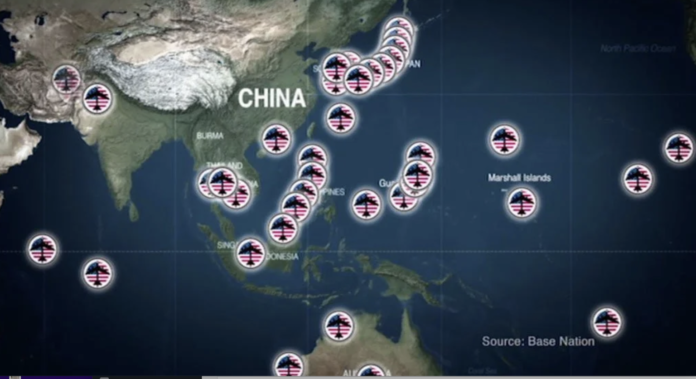Tongan gun problems
The ABC reports that Tongans are increasingly arming themselves, often illegally and that the day-to-day carriage of firearms is becoming more common in the community. A situation with serious security implications for the nation. The reports states that Tongans cite rising crime rates and increasing violence as the reasons for arming themselves.
Another factor is that Pacific nations like Tonga are used by international criminal gangs as a transit point for smuggling drugs into Australia and New Zealand. Tonga has a large coastline and limited surveillance and law enforcement capability making it an easy place to smuggle drugs or guns. It also has a close relationship with Australia and New Zealand, people frequently travelling relatively freely between these nations providing opportunities for drug smuggling.
Sometimes insiders play a role in the lucrative trade and last a month customs officer was arrested smuggling a selection of firearms and ammunition into the country. Tonga is a small nation with a population of about 106,000 and ABC reports that over the last five years 2,000 illegal guns have been confiscated by police.
Numbers that make the trend both significant and alarming. The proliferation of firearms in communities with relatively weak governance and institutions is very dangerous. In November 2006, the capital Nuku’alofa was severely damaged in a politically inspired riot. Police and military support from Australia and New Zealand were required to restore order.
An event that could have been much more dangerous if the community was heavily armed. Additionally, rendition to Tonga of convicted criminals of Tongan descent from the United States and Australia provides local connections for criminal organisations exacerbating the possibility of drug and firearms smuggling.
More trouble in the South China Sea, Chinese Coastguard get physical
Chinese Coastguard and militia (police) vessels physically blocked Philippines ships trying to resupply its garrison on the Second Thomas Shoal. Chinese vessels making contact with and ‘bumping’ Philippines vessels on 22 October. Dangerous and aggressive actions designed to intimidate.
Philippines has a small garrison on the shoal that is there to enforce the nation’s claim to the area. The garrison is housed in an old ship. China is trying to prevent resupply of the Philippines soldiers on the shoal. The aim being to starve the Philippines garrison and force their removal from the shoal.
China’s strategy and tactics are straight out of the hybrid warfare ‘play book,’ it uses a pseudo-legal justification to assert its ‘right’ to occupy Second Thomas Shoal. Regardless, of the fact that international courts do not support the claim. China then enforces its claim using para-military internal security forces like the Coastguard and militia. Using these forces instead of the military plays to the narrative that Second Thomas Shoal is in fact Chinese territory. It also reduces the chances of military escalation from other nations.
China’s Coastguard has large and very capable vessels that are easily able to physically push, bump or even ram Philippines Coastguard vessels. How can Philippines respond? If its navy or air force sinks a Chinese Coastguard vessel it risks escalation and provides China with moral basis for information operations (propaganda) that undermine the nation’s claim to the shoal. It is a tough situation and provides insight into the future of hybrid conflict in the Pacific.
The counters to hybrid war tactics are; transparent rule of law and deterrence. The international rule of law provides a transparent basis for diplomacy and by supporting valid claims nations protect their own rights within that system. Ignoring pseudo-legal or unsubstantiated claims is good for all small nations. However, the price of the international rule of law is deterrence because nations that support it must also be committed to deterring nations from using aggression to enforce claims. This is why many nations support Ukraine, and the reason that the United States is building a network of allies and partners in the Pacific. By working together nations share the costs of deterrence and even small nations can expect their territorial rights to be protected.
China, Australia and Timor Leste diplomatic battles in South-East Asia
Last month Timor Leste signed a strategic partnership deal with China. Prime Minister Xi Jinping and Prime Minister Xanana Gusmao meeting at the Asian Games and announcing a strategic partnership. The partnership includes infrastructure development, finance, agriculture, health and economic support. Agricultural aid is especially important because Timor Leste has significant food supply problems. In exchange, Timor Leste affirmed the ‘One China’ policy the agreement stating that “Taiwan is an inalienable part of China’s territory and oppose any forms of ‘Taiwan independence.‘’
This statement is an example of ‘legal warfare,’ within the spectrum of hybrid war. Every nation that affirms the ‘One China’ policy and votes in international forums to support it, provides China with an increased mandate for aggression. Further, the support of small nations in international forums can be leveraged to present a legal claim in terms of a justifiable reaction to the historic colonial powers, a form of rebellion against the existing international ‘establishment.’ A powerful narrative in many now independent nations that suffered colonisation.
China’s interest in Timor Leste is not new, in 2002 it was the first nation to recognise the new country. It is an indicator of the nation’s strategic location that Prime Minister Xi took time to meet with Prime Minister Gusmao. This is a relationship that Australian politicians have been quick to criticise and this criticism continued in October. Australia is the nation’s largest donor and provides considerable defence support. President of Timor Leste, José Ramos-Horta responded to this criticism with a statement on 9 October alleging that Chinese diplomats took military aid ‘off the table’ worried about an Australian ‘over reaction.’ Timor Leste is another fault line in Pacific security, one located very close to Australia and worth keeping a close watch on.
Melanesian update
A regular update on the Pacific’s least reported trouble spot; Melanesia.
Fiji and Australia sign an elevated partnership deal
On 18 October, Australia and Fiji announced a new $68 million partnership agreement. The announcement was made during Fijian Prime Minister, Sitiveni Rabuka’s visit to Australia. The deal provides economic aid and includes cyber security support, streamlining visa processes and the sale of 14 Bushmaster armoured vehicles.
Australian Prime Minister, Anthony Albanese praised Prime Minister Rabuka’s commitment to relationships with traditional friends like Australia and the United States. Under Prime Minister Rabuka, Fiji has moved away from Chinese influence and further into the United States sphere of influence. Fiji is positioned to play a powerful role providing a bridging relationship between the smaller Pacific nations and larger powers like Australia.
Papua New Guinean and China discuss common currency arrangements
Papua New Guinea Prime Minister, James Marape’s visit to China included an interesting discussion about a common trade currency between the nations. Currently, like many small nations Papua New Guinea trades internationally using the USD.
The discussion moved towards recognition of each other’s currency and the establishment of China Development Bank offices in Papua New Guinea to manage financial transactions.
This discussion has wider implications because the USD is the premium currency of international trade. Almost every nation recognises the USD and that recognition gives the currency an intrinsic value that supports the United States economy. China’s competition with the United States is not only military but economic. By providing options other than the USD for trade China seeks to devalue America’s currency and reduce the nation’s economic power. The Prime Minister Marape’s discussions could be the start of something much bigger as China uses the size of it domestic market to convince smaller nations to give up the USD in favour of the Yuan, as their currency for international trade.
Papua New Guinea fuel shortage
A fuel shortage means that petrol may soon be rationed in Papua New Guinea. Most of Papua New Guinea’s petrol is supplied by Puma Energy. The company has been warning of fuel shortages for some time stating that a lack of foreign currency (i.e.USD) makes it impossible to buy fuel on international markets.
The links between this situation and Prime Minister Marape’s discussion with China about transactions using their currency are easy to see and demonstrate how economic situations are used to build influence in smaller nations.
Ben Morgan is a bored Gen Xer and TDBs military blogger





From what I remember Sadam Hussein wanted to trade in oil without using the US dollar also, that did not work out for him. Hopefully, PNG get a better result.
Hey Ben!
Still waiting for your Middle East Intelligence Update.
What are the views of your sources on the genocide in Gaza?
Did Hamas really decapitate Jewish babies as the head of IDF keeps repeating. and US President Joe Biden claims is confirmed?
https://www.youtube.com/watch?v=QdeSuY6rbrg
Is it true that a lot of the Israeli deaths were due to ‘Friendly Fire’?
Can you tell us about the Hannibal Protocol?
When will the ground invasion start?
Are you privy to any insights that would help us penetrate the fog of war?